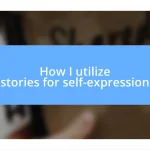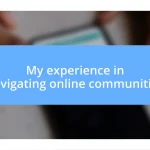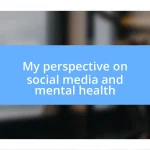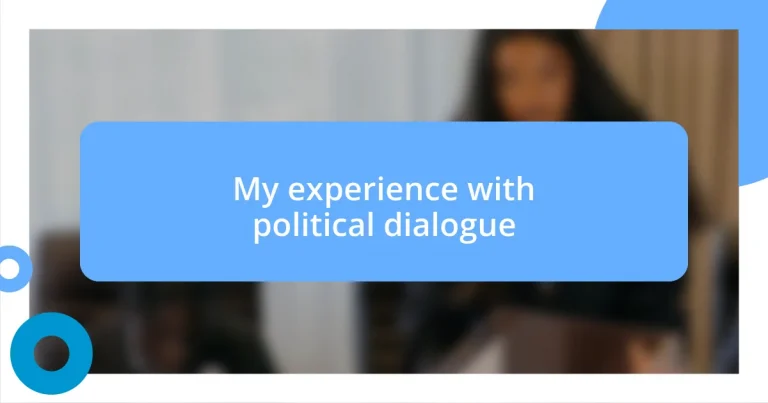Key takeaways:
- Political dialogue thrives on active listening, empathy, and open-mindedness, enabling participants to understand diverse perspectives and foster meaningful connections.
- Effective communication is crucial for building trust, preventing conflict, and encouraging participation, ensuring that discussions remain productive and inclusive.
- Overcoming challenges in dialogue requires patience, adaptability, and the ability to validate emotions, transforming tense conversations into collaborative and constructive exchanges.
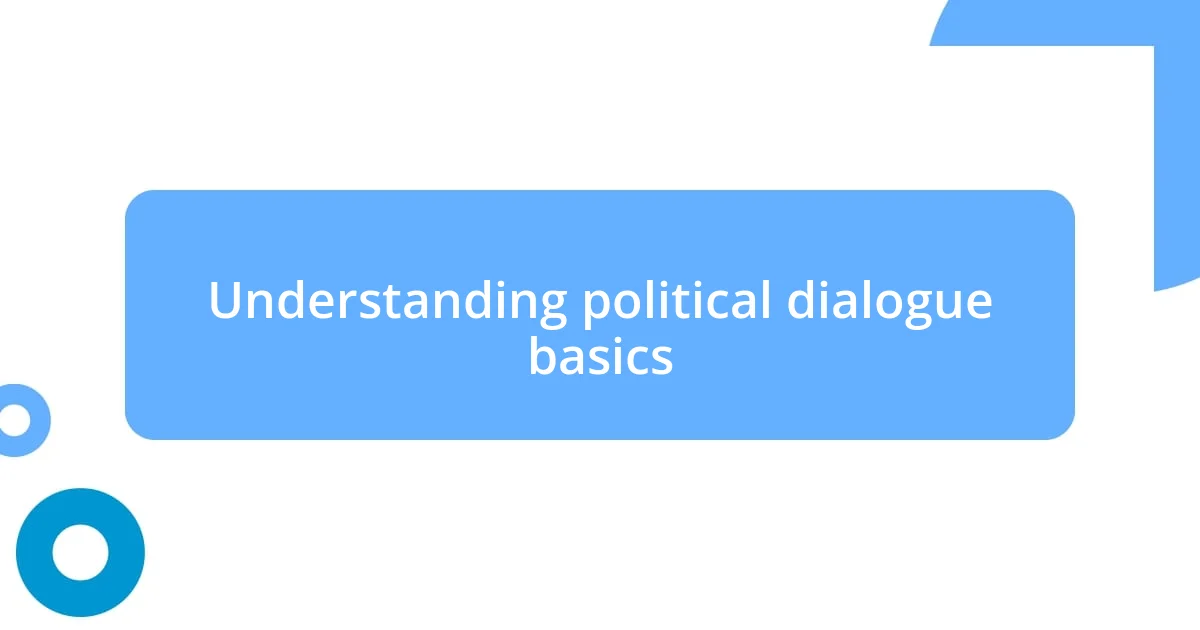
Understanding political dialogue basics
Political dialogue is much more than just exchanging opinions; it’s about truly understanding different perspectives. I remember a time when I engaged in a heated discussion about healthcare policies with a friend who held quite the opposite view. Rather than just defending my stance, I took a step back and asked, “What experiences shaped your beliefs?” It was enlightening to hear her story about a family member struggling with the system, and that moment underscored how personal narratives can enrich political conversations.
At its core, political dialogue relies heavily on active listening. I’ve found that by genuinely hearing what someone else has to say, I can respond in a way that acknowledges their feelings and viewpoints. This listening isn’t passive; it’s a dynamic process that sometimes leads to unexpected insights. Have you ever experienced that moment when a seemingly trivial comment suddenly shifts your understanding of a complex issue? Those moments are invaluable in building a sturdy foundation for respectful dialogue.
Finally, it’s essential to approach political discussions with an open mind and a willingness to learn. I once entered a debate convinced of my opinions, but as the conversation unfolded, I discovered areas where my views could evolve. This flexibility fosters a richer understanding and encourages others to share their thoughts without fear of judgment. Isn’t it fascinating how dialogue can transform our perspectives, sometimes even in ways we least expect?
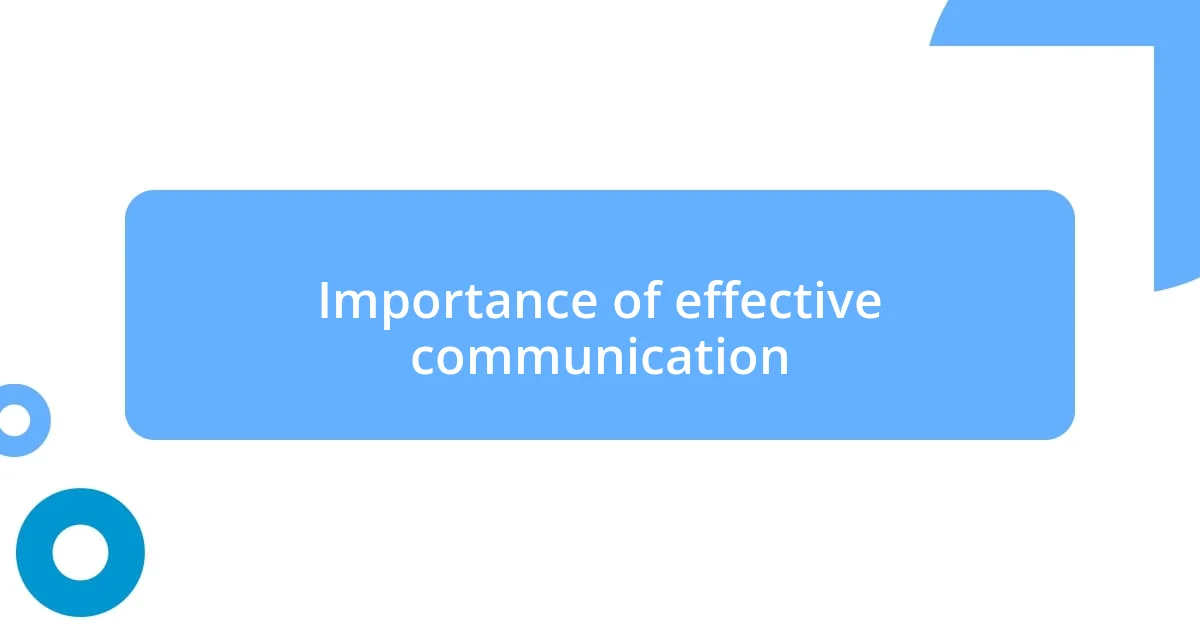
Importance of effective communication
Effective communication is the backbone of meaningful political dialogue. I’ve learned firsthand that when engaging in discussions about polarizing topics, clarity becomes crucial. A memorable instance was during a town hall meeting where miscommunication led to frustrations on both sides. Seeing the confusion in the audience reminded me how vital it is to express thoughts clearly and invite questions. Without that clarity, misunderstandings can snowball, creating walls rather than bridges.
Here are some key reasons why effective communication is fundamental in political dialogue:
- Build Trust: Clear communication establishes credibility and openness, fostering trust among participants.
- Encourage Participation: When people feel understood, they’re more likely to contribute their perspectives, enriching the discussion.
- Prevent Conflict: Effective dialogue reduces the risk of escalated tensions by ensuring that everyone’s voice is heard and considered.
- Facilitate Understanding: Articulating ideas simply helps break down complicated issues, making them accessible to all, regardless of their background.
- Promote Collaboration: Open lines of communication pave the way for joint problem-solving, essential for finding common ground in political conversations.
In my own experience, when I’ve taken the time to articulate my thoughts carefully, I’ve often found that dialogues flow more smoothly and lead to productive outcomes.
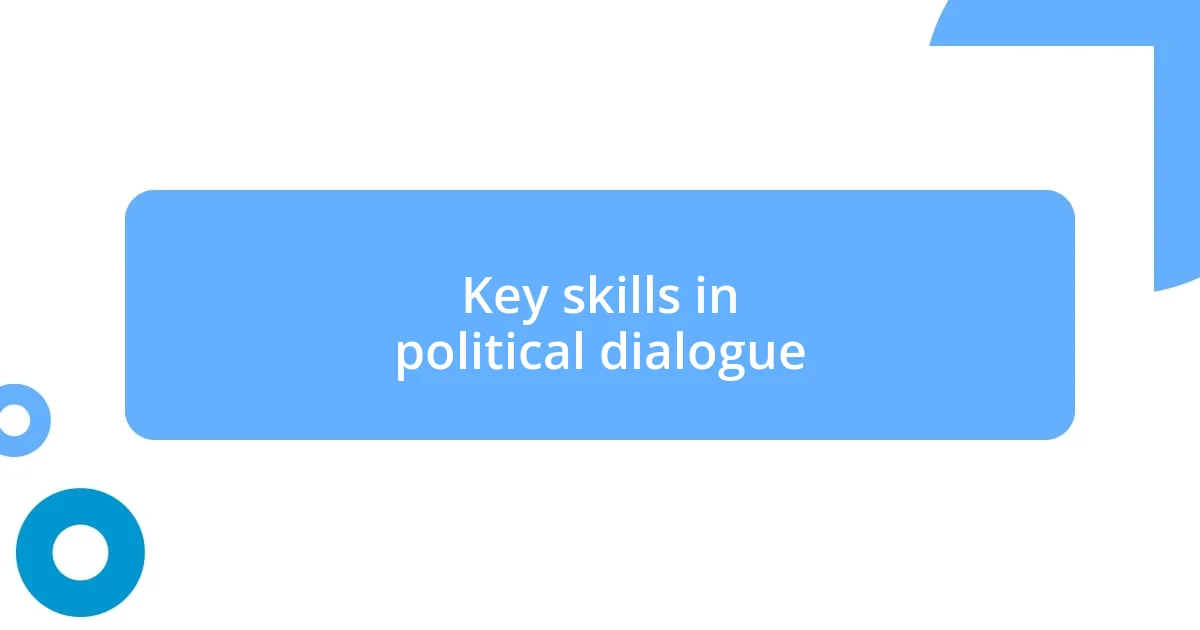
Key skills in political dialogue
When it comes to political dialogue, empathy is a key skill. I once participated in a community forum discussing immigration policies. I shared my perspective, but what truly opened my eyes was when someone shared their story of fleeing violence for a better life. That moment highlighted how empathy allows us to connect deeper and understand the human stories behind policies, promoting a more compassionate conversation.
Another crucial skill is critical thinking. I recall attending a political debate where several participants made sweeping generalizations about economic policies. Instead of taking their statements at face value, I asked for specific examples to support their claims. This approach not only clarified the discussion but also encouraged others to think critically about their own views. It’s amazing how questioning assumptions can lead to richer, more informed conversations.
Lastly, adaptability in dialogue can’t be overstated. I faced a situation where my position on climate change was challenged by someone presenting strong evidence contrary to my beliefs. Rather than doubling down, I embraced the moment as a learning opportunity. This flexibility allowed me to revise my stance, showing how adaptability in dialogue can enhance learning and foster stronger connections among participants.
| Skill | Description |
|---|---|
| Empathy | Connecting with personal stories to understand different perspectives. |
| Critical Thinking | Questioning assumptions and seeking evidence to enrich discussions. |
| Adaptability | Being open to change beliefs based on new information. |
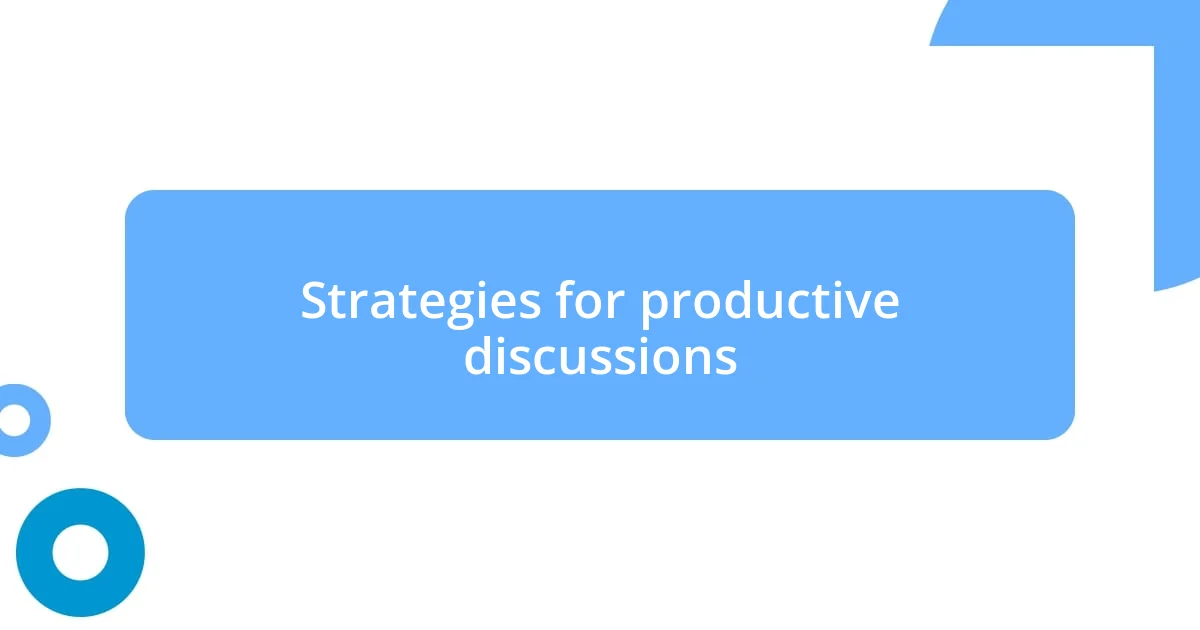
Strategies for productive discussions
In my experience, setting the right tone can significantly enhance the outcome of political discussions. During a heated debate on healthcare reform, I remember starting with a positive note, expressing gratitude for everyone’s willingness to engage on such a crucial issue. That simple acknowledgment shifted the atmosphere, fostering a more open exchange of ideas. Have you ever noticed how a warm approach can sometimes defuse tension? It certainly worked wonders that day, allowing for a more thoughtful exploration of differing viewpoints.
One essential strategy I’ve employed is to actively listen. There was a moment at a community roundtable where a participant passionately voiced their concerns about taxation. Instead of preparing my counter-argument, I focused fully on understanding their position. This not only made them feel valued but also allowed me to later address their concerns more effectively. It’s astonishing how much can be gained when we genuinely listen to others—have you tried it? You might find that it leads to unexpected insights that enrich the dialogue for everyone involved.
Another technique I’ve found effective is finding common ground. In a discussion surrounding education reform, I emphasized shared goals, like improving student outcomes. By highlighting our mutual interests upfront, we transformed a potentially divisive conversation into a collaborative effort aimed at enhancing the education system. This feels rewarding, doesn’t it? It’s rewarding to realize that beneath our differing opinions, we often share fundamental desires that can pave the way for productive discussions.
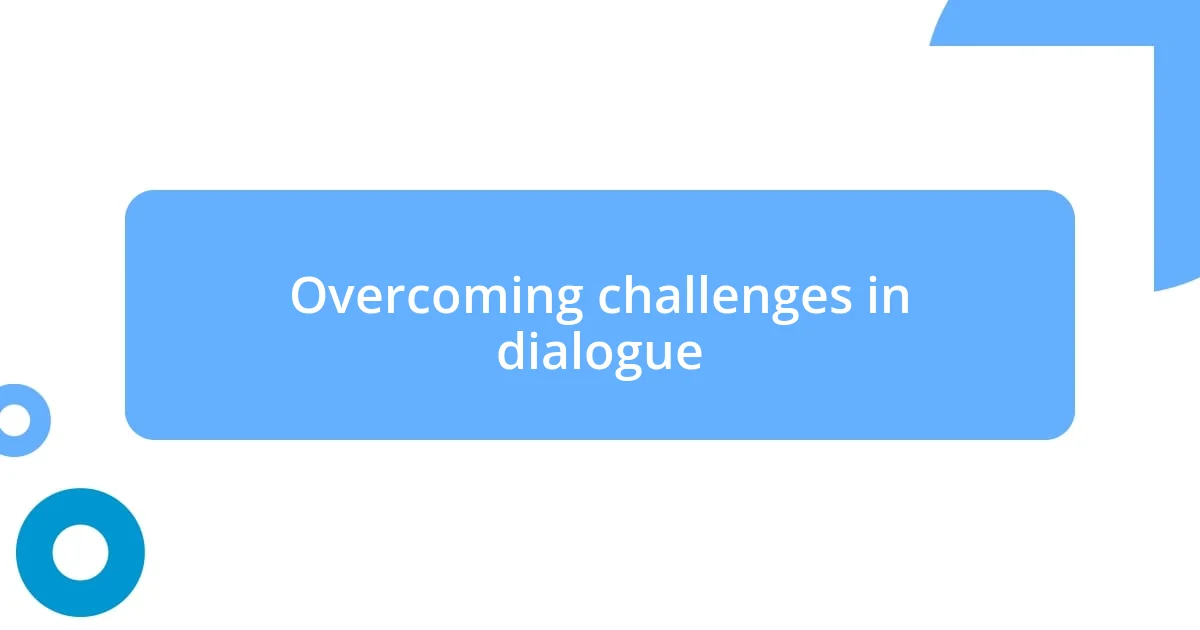
Overcoming challenges in dialogue
Engaging in political dialogue often comes with its share of challenges, particularly when the emotions run high. I had a memorable experience during a city council meeting about housing policy. As tensions escalated between opposing groups, I took a step back to assess the room’s energy. I realized that emotions were driving much of the disagreement. By acknowledging these feelings and encouraging participants to express their concerns, we managed to create a calmer environment, which facilitated more thoughtful exchanges. Have you ever found that simply validating emotions can shift the dynamics of a discussion?
Another significant hurdle I’ve encountered is the tendency for discussions to veer off topic. There was a time when discussing environmental regulations, someone started sharing unrelated political grievances. Instead of dismissing their comments, I made a conscious effort to steer the conversation back by connecting their grievances to our current topic. I asked how their experiences were influencing their views on environmental policy. This not only kept the focus on the issue at hand but also allowed room for deeper understanding. Have you ever redirected a conversation and found it led to unexpected insights?
Lastly, I’ve learned that overcoming resistance to certain ideas requires patience and persistence. During a debate on renewable energy, I faced pushback from individuals who believed in the status quo. Instead of arguing harshly against their points, I chose to explore their concerns with curiosity. I asked them about their fears of change and shared data about successful transitions in other communities. It was enlightening to witness their gradual shift in perspective. Hasn’t it been your experience that approaching resistance with curiosity can sometimes lead to surprising breakthroughs?
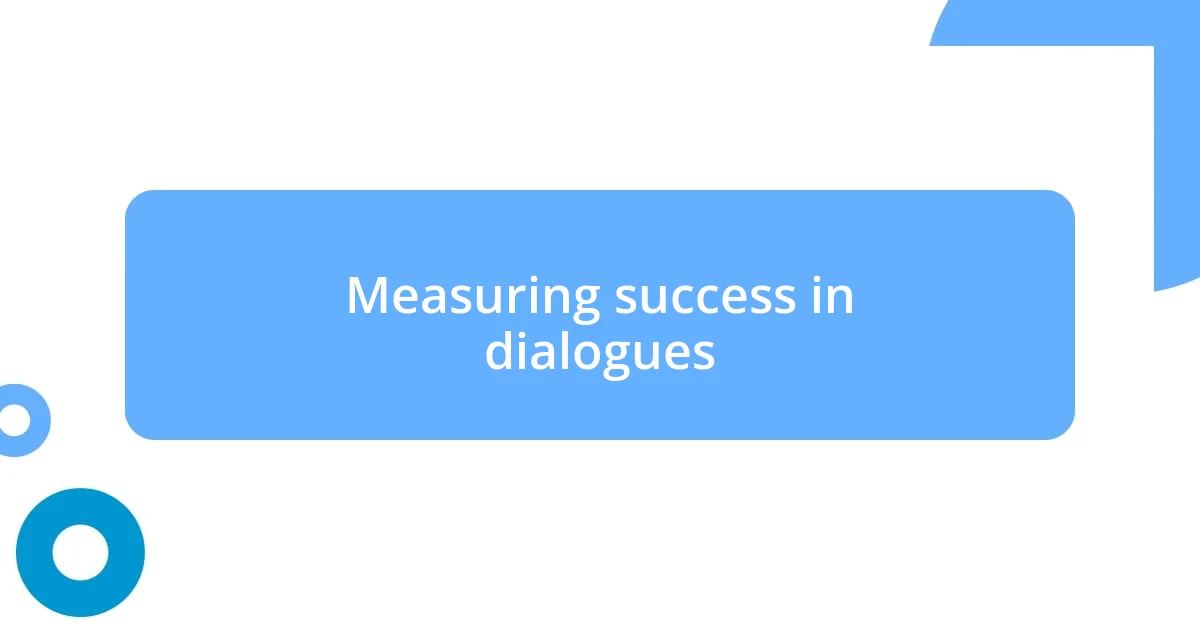
Measuring success in dialogues
Success in dialogues can often be gauged by how well participants feel understood. In one instance, I was part of a discussion regarding immigration policy where one member expressed feelings of alienation. By taking the time to validate her experiences and reflect her emotions back to her, I could see her body language shift from defensive to open. It struck me—how often do we overlook the emotional undercurrents in a conversation? Recognizing these feelings can be the key to unlocking a fruitful dialogue.
Another vital measure is the level of engagement demonstrated by participants. During a community forum about public transportation, I noticed that some voices were more hesitant. I made it a point to encourage quieter members by directly asking them for their thoughts. Their eventual contributions brought fresh perspectives to the discussion, reminding me that inclusivity often enriches the conversation. Have you noted how a simple invitation to share can sometimes lead to the most profound insights? It reminds me of the power we all wield to elevate each other’s voices.
Lastly, the tangible outcomes of these dialogues often reflect their success. After engaging in an extensive discussion on local environmental initiatives, I was thrilled when the council adopted a proposal based on our collective input. It dawned on me that real change stems from collaborative dialogue, where everyone’s voice contributes to shaping decisions. Have you ever witnessed a conversation propel into actionable results? It’s a testament to the importance of open dialogue and how it can translate into meaningful impact in our communities.
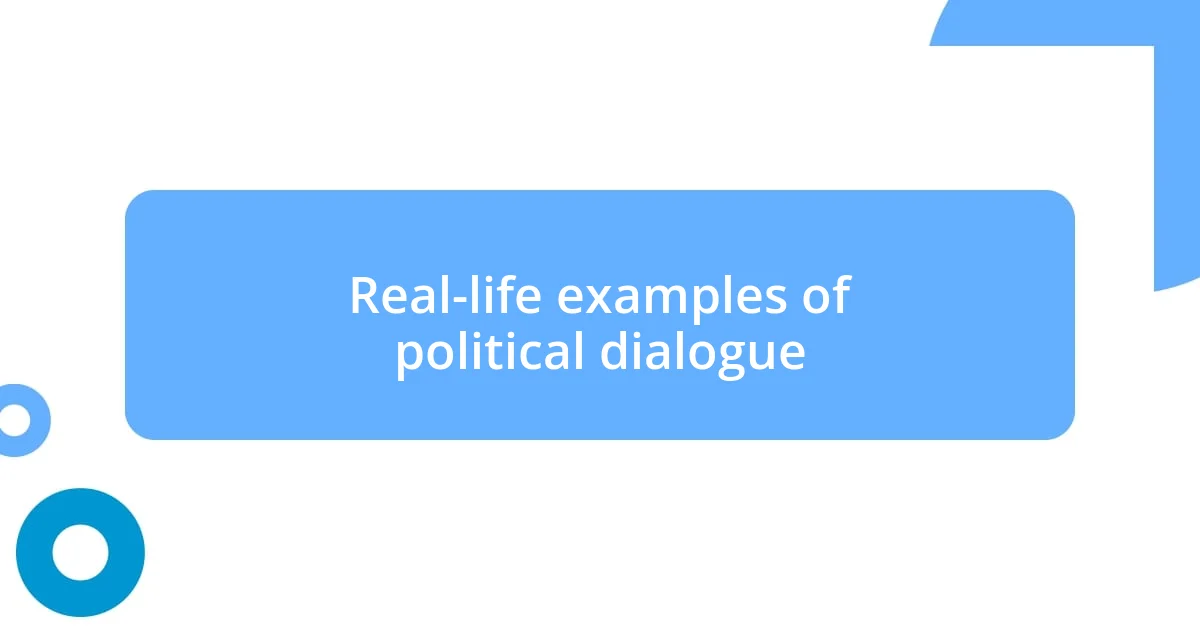
Real-life examples of political dialogue
During a recent town hall meeting, I found myself in the middle of a heated discussion over a proposed tax increase aimed at improving local schools. What struck me was how participants from different backgrounds shared personal stories about their experiences with education. One individual recounted how their child struggled in overcrowded classes, bringing to light a perspective I hadn’t considered before. This genuine exchange highlighted how listening intently can transform a divisive topic into a shared concern. Have you ever noticed how personal narratives can foster empathy in a discussion?
A few months back, I participated in a small debate club where we tackled the complexities of climate change. There was a moment when tempers flared over differing opinions on climate policy. I took a deep breath and suggested that we all share what initially drew us to the topic, creating a moment of connection. As each person expressed their passions and fears about the environment, the tension in the room softened. It was fascinating to see how vulnerabilities could dissolve hostility. Isn’t it interesting how shared values can bridge seemingly insurmountable divides?
In a more light-hearted setting, I recall a community picnic that turned into an impromptu discussion about neighborhood safety. As folks shared their experiences, I realized that everyone wanted the same outcome—feeling safe in their homes. Using humor to navigate a particularly tense moment, I joked about how we might need a neighborhood watch group comprised entirely of cats, eliciting laughter and uniting everyone in a shared vision. This reminded me of the importance of levity in political dialogue. Have you found that humor can sometimes be the most effective tool in bridging serious topics?








